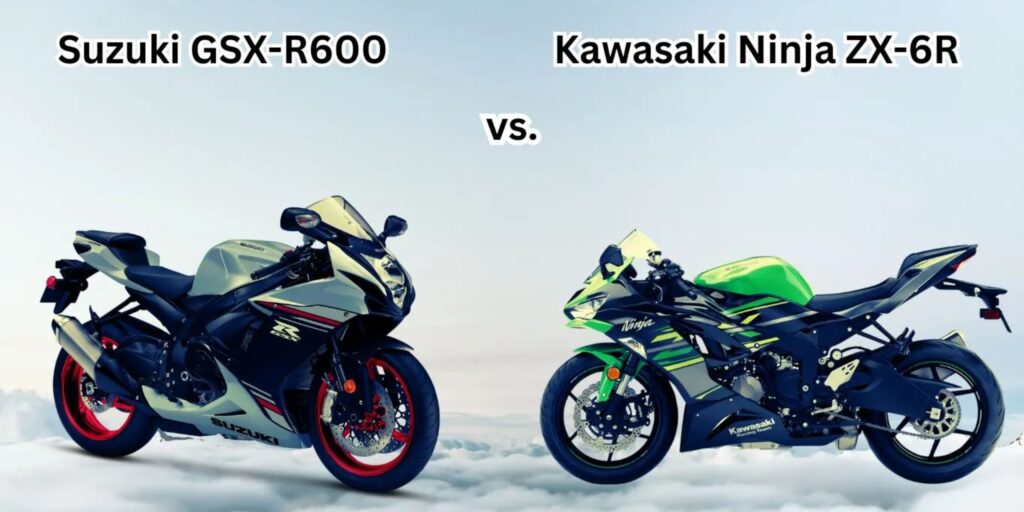Introduction:
When you enter the world of high-performance motorcycles, the Kawasaki Ninja ZX-6R and the Suzuki GSX-R600 stand out as top contenders. They promise an exciting ride, whether you’re navigating mountain roads or cruising on the highway.
- Kawasaki Ninja ZX-6R: This bike features an aggressive design and a powerful 636cc engine. It is known for its excellent mid-range performance. Riders enjoy a blend of speed and control, making it appealing to both everyday users and track fans.
- Suzuki GSX-R600: With a 599cc engine, this motorcycle is famous for its high-revving capabilities and sharp acceleration. Its iconic look and aerodynamic shape attract those who value a mix of tradition and modern performance.
Both bikes are packed with advanced technology and safety features. This ensures that every ride is thrilling and secure.

2. Power and Performance Comparison
Engine and Horsepower
One of the first things you’ll notice about these bikes is their power profile:
- Kawasaki Ninja ZX-6R:
- Engine: 636cc inline-four
- Horsepower: Approximately 127 hp
- Torque: Around 52 ft-lbs
- Suzuki GSX-R600:
- Engine: 599cc inline-four
- Horsepower: Approximately 104 hp
- Torque: About 44 ft-lbs
The ZX-6R’s larger engine displacement gives it a slight edge in horsepower and torque, translating to more power when you push the throttle—especially noticeable in mid-range performance. Meanwhile, the GSX-R600 shines with its high-revving character, meaning it can deliver a burst of speed when you need it most.
Read more:
Acceleration and Top Speed
Both bikes are designed for quick acceleration, but here’s how they stack up:
- Acceleration: The Suzuki GSX-R600 is known for its snappy acceleration. It can sprint from 0 to 60 mph in just around 3.1 seconds. The Ninja ZX-6R, with its extra displacement, follows closely at roughly 3.2 seconds. In practical terms, both bikes offer heart-pounding speed, though the GSX-R600 may feel a bit quicker off the line.
- Top Speed: The Ninja ZX-6R can hit a top speed of about 262 km/h (around 163 mph), while the GSX-R600 reaches approximately 248 km/h (around 154 mph). The slight edge in the ZX-6R’s top speed is thanks to its superior power output.
Real-World Riding
In everyday riding situations—whether commuting in the city or hitting the track—both bikes perform admirably. The ZX-6R’s strength lies in its smooth power delivery across various speeds, while the GSX-R600’s punchy response makes it ideal for those who love that extra kick during acceleration.
3. Design and Styling: Which Looks the Part?
A motorcycle isn’t just about performance; it’s also about making a statement on the road.
Kawasaki Ninja ZX-6R: Bold and Aggressive
The Ninja ZX-6R is designed to turn heads. Its aggressive, muscular stance is complemented by:
- Sleek, Modern Lines: The sharp angles and aerodynamic curves not only look cool but also improve stability at high speeds.
- Dual LED Headlights: These add a futuristic touch and enhance visibility at night.
- Intimidating Presence: The ZX-6R’s overall design exudes power, making it an excellent choice for riders who want a bike that stands out in a crowd.
Suzuki GSX-R600: Classic Sportbike Charm
On the flip side, the GSX-R600 embraces a classic yet sporty aesthetic:
- Streamlined Aerodynamics: Its design is focused on reducing drag, giving it an edge in efficiency and performance.
-
- Iconic Graphics: The GSX-R600 showcases Suzuki’s design history, blending classic sportbike style with modern updates.
- Subtle Styling Cues: The GSX-R600 offers a more understated design than the Ninja, appealing to riders who prefer a sleek and timeless appearance.
Ergonomic Considerations
Both bikes are designed with rider comfort in mind:
-
- Ninja ZX-6R: Comes with adjustable features like the clutch lever and suspension. You can customise the ride for your comfort.
- GSX-R600: It has a sportier riding position but still focuses on comfort. Its controls and seating fit well for long rides.
Choosing between the two often comes down to personal taste. Do you prefer the futuristic, aggressive look of the Ninja ZX-6R, or does the classic sportbike charm of the GSX-R600 speak to you more?
4. Engine and Technology: Under the Hood
The technology packed into these bikes is as exciting as their looks. Let’s take a closer look at what powers each machine.
Engine Characteristics
- Kawasaki Ninja ZX-6R: The 636cc engine is a powerhouse designed to deliver a balanced mix of low-end torque and high-rev performance. Its liquid-cooling system ensures that the engine maintains optimal performance even under stress.
- Suzuki GSX-R600: The 599cc engine is built for high-revving performance. This means that while it may not produce as much torque at lower speeds as the ZX-6R, it excels when you push the engine to higher revs—perfect for track days and spirited riding.
Transmission and Clutch
Smooth power delivery is key for a sportbike, and both motorcycles feature a 6-speed transmission:
- Ninja ZX-6R: Comes with a 6-speed cassette transmission that allows for quick, precise gear shifts. The addition of a slipper clutch helps prevent wheel hop during aggressive downshifting, making the ride smoother and safer.
- GSX-R600: Also features a 6-speed transmission paired with a back-torque limiting clutch. This setup ensures smooth gear transitions and helps maintain control during rapid acceleration and deceleration.
Advanced Electronics and Rider Aids
Both bikes are equipped with modern electronics designed to boost performance and safety:
- Kawasaki’s Innovations:
- KTRC (Kawasaki Traction Control): Helps maintain traction by adjusting power delivery based on riding conditions.
- Multiple Power Modes: Let you choose different settings depending on whether you’re riding in the city or on a track.
- Digital Instrument Display: Provides real-time data like speed, gear position, and engine temperature.
- Suzuki’s Features:
- Suzuki Drive Mode Selector (S-DMS): Allows riders to switch between different engine maps, tailoring the throttle response to suit various riding environments.
- Advanced Fuel Injection System: Ensures optimal engine performance and better fuel efficiency.
- Anti-Theft Immobilizer: Offers additional security by ensuring the bike only starts with the correct key.
Both bikes make excellent use of technology to enhance the riding experience, whether you’re looking for a smooth ride on city streets or pushing your limits on the track.
5. Handling and Ride Quality: The Thrill of the Road
A critical aspect of any sportbike is how it feels on the road. Handling and ride quality can make a big difference in your overall riding experience.
Ninja ZX-6R: Agility and Precision
- Responsive Suspension: The ZX-6R is equipped with an adjustable suspension system that adapts to different riding conditions. Whether you’re taking tight corners or cruising on the highway, the suspension offers a stable and comfortable ride.
- Lightweight Frame: Its design promotes nimble handling, giving you a sense of control even at high speeds.
- Feedback and Control: The bike’s responsive steering provides excellent feedback, allowing for precise maneuvering in urban settings or on winding roads.
GSX-R600: Stability and Confidence
- Balanced Chassis: The GSX-R600 is engineered with a focus on both stability and agility. Its chassis is designed to provide a planted feel, especially at higher speeds.
- Smooth Handling: With premium suspension components, the GSX-R600 offers a ride that is both forgiving on uneven roads and confident in high-speed scenarios.
- Rider Position: Its sportier riding position is perfect for those who enjoy a more dynamic riding style, though it may be slightly more aggressive than the ZX-6R’s posture.
Side-by-Side Comparison
When you compare the two head-to-head:
- The Ninja ZX-6R tends to feel sharper and more responsive in tight, twisty roads.
- The GSX-R600 offers a bit more stability, especially when pushing the bike to its limits on a track or open highway.
Ultimately, both bikes provide a thrilling ride. The choice will depend on whether you prioritize pinpoint handling or overall stability.
6. Braking and Safety Features: Confidence in Every Stop
High performance means you also need top-notch safety and braking systems. Both bikes are designed to provide strong stopping power and rider confidence.
Braking Systems
- Kawasaki Ninja ZX-6R:
- Front Brakes: Dual 310mm discs with ABS.
- Rear Brake: Single 220mm disc.
- Calipers: High-quality Nissin monobloc calipers that offer precise braking control.
- Suzuki GSX-R600:
- Front Brakes: Dual 310mm discs equipped with ABS.
- Rear Brake: Single 220mm disc.
- Calipers: Brembo monobloc radial-mount calipers ensure strong, consistent braking pressure.
Both bikes’ braking systems are engineered to minimize stopping distances and prevent wheel lock-up, even during sudden braking. Whether you’re riding in heavy traffic or on a race track, these features provide extra assurance that you’ll be able to stop safely when needed.
Additional Safety Features
- Traction Control: The Ninja ZX-6R features KTRC, while the GSX-R600 has drive mode options. These systems optimise traction and reduce slipping on wet or uneven roads.
- Rider Assistance Systems: Advanced features like the quick shifter on some ZX-6R models and low RPM assist on the GSX-R600 keep your ride stable during fast gear changes. This makes your ride smoother and safer.
7. Ergonomics and Comfort: Designed for You
No matter how powerful or fast a bike is, if it’s uncomfortable to ride, you won’t enjoy it in the long run. Both the Ninja ZX-6R and GSX-R600 offer ergonomic designs that consider rider comfort over long journeys and daily commutes.
Ninja ZX-6R: A Comfortable Yet Sporty Ride
-
- Seating Position: The ZX-6R has a riding position that balances sportiness and comfort. The seat supports your back and hips, making long rides easier.
- Handlebar and Foot Peg Placement: With well-placed controls, the bike reduces strain on your arms and legs. This allows for a more relaxed and engaged ride.
- Adjustability: Features like adjustable suspension and clutch levers let you customise the bike to suit your size and riding style.
GSX-R600: Sporty with a Focus on Fit
- Riding Posture: The GSX-R600 tends to have a slightly more aggressive riding position. While this is perfect for track days and spirited rides, it still provides enough comfort for daily riding.
- Seat Design: The seat is well-cushioned and contoured to support you during long hours on the bike, even if you’re leaning into corners.
- Control Layout: Suzuki’s design positions the controls within easy reach. This reduces fatigue and helps you maintain full control at all times.
8. Fuel Efficiency: Getting More Miles for Your Money
Fuel efficiency is an important factor, especially if you plan on using your sportbike regularly. Let’s look at how the two bikes compare in this regard.
Kawasaki Ninja ZX-6R Fuel Economy
- Mileage: The Ninja ZX-6R typically offers around 40-45 miles per gallon (mpg), which is impressive for a performance bike with a 636cc engine.
- Efficiency Factors: Its advanced fuel injection system and active aerodynamics help reduce drag and optimize fuel use, meaning you can enjoy more rides between fill-ups.
Suzuki GSX-R600 Fuel Economy
- Mileage: The GSX-R600 generally delivers a fuel economy of around 43-48 mpg. Its efficient 599cc engine, combined with a lightweight frame, helps maximize every drop of fuel.
- Economic Riding: The GSX-R600 provides better mileage in some conditions. This makes it an attractive choice if fuel costs and long-term efficiency matter to you.
9. Electronics and Extra Features: The Tech Behind the Thrill
Modern sportbikes are not just about raw power—they are also packed with electronic features that make rides smoother, safer, and more enjoyable.
Key Features in the Ninja ZX-6R
- Digital Fuel Injection: Ensures efficient combustion and smooth power delivery.
- Multiple Riding Modes: Allows you to adjust the bike’s performance to suit various conditions, whether you’re in the city or on a track.
- Kawasaki Traction Control (KTRC): Helps prevent wheel spin, enhancing stability during aggressive riding.
- * **Quick Shifter (Optional on some models):** Allows smooth gear changes without using the clutch, keeping power flowing nonstop.Noteworthy Features in the GSX-R600
-
- Suzuki Drive Mode Selector (S-DMS): Lets you switch between engine settings. This gives you control over throttle response and power output.
- Advanced Fuel Injection System: Boosts fuel efficiency and ensures steady power from the engine.
- Security Features: Comes with an immobilizer system to help protect your bike from theft.
- Digital Instrument Panel: Shows key information like speed, gear position, and engine diagnostics clearly.
Both bikes integrate state-of-the-art electronics to enhance your riding experience. The choice between them often depends on which set of features aligns better with your personal preferences.
10. Pricing and Value for Money: Budgeting Your Dream Ride
Investing in a sportbike isn’t just about performance—it’s also about getting the best value for your money. Here’s how the two bikes compare in terms of cost and long-term value.
Initial Purchase Price
- Kawasaki Ninja ZX-6R: The Ninja ZX-6R generally has a higher starting price, often around $10,200 or more.
- The extra cost is often justified by its advanced technology, premium features, and strong performance.
- Suzuki GSX-R600: The GSX-R600 is usually more affordable, with prices starting in a similar range but sometimes lower.
Long-Term Ownership Costs
When considering long-term expenses, take into account:
- Maintenance: Both bikes are built by reputable manufacturers known for reliability. However, maintenance costs can vary.* The Ninja ZX-6R may have higher insurance costs because of its premium status. However, its advanced features can lead to fewer repairs. The GSX-R600 is cheaper to buy but might need more regular maintenance. Still, parts for it are easy to find and often less expensive.
- Resale Value: Premium models like the Ninja ZX-6R often hold their value better over time. If you plan to sell or trade your bike later, this could be a crucial factor.
- Fuel Costs: As discussed earlier, both bikes offer competitive fuel efficiency. However, small differences in mileage could add up depending on how frequently you ride.
Value for Money
Ultimately, the decision between these two bikes may come down to your budget and how you plan to use your bike:
- If you value cutting-edge technology, a slightly higher top speed, and a premium design, the Ninja ZX-6R might be worth the extra investment.
- If you are looking for a slightly more affordable option that still packs plenty of performance and style, the GSX-R600 is a strong contender.
11. Final Verdict: Which Bike Should You Choose?
When you compare everything—from power and design to technology and price—the choice between the Kawasaki Ninja ZX-6R and Suzuki GSX-R600 depends on your riding style and what matters most to you.Choose the Ninja ZX-6R if you:
-
- Crave a powerful engine with robust mid-range performance.
- Love a futuristic, aggressive design that makes a bold statement.
- Value advanced rider aids like traction control and multiple riding modes.
- Are willing to invest a little extra for premium features and potentially better resale value.
- Choose the GSX-R600 if you:
- Prefer a high-revving engine that delivers an energetic burst of speed.
- Appreciate a classic sportbike look with streamlined aerodynamics.
- Want a slightly more budget-friendly option without sacrificing performance.
- Enjoy a dynamic riding experience that offers excellent stability and handling.
Before making your final decision, consider test riding both models if possible. Experiencing each bike firsthand is the best way to determine which one fits your riding style, comfort needs, and budget. Whichever you choose, you’re guaranteed a thrilling ride that brings you closer to the heart-pounding excitement of high-performance motorcycling.
12. Frequently Asked Questions (FAQ)
Q1: What is the main difference between the Kawasaki Ninja ZX-6R and Suzuki GSX-R600?
A1: The primary differences lie in their engine performance and design philosophy. The Ninja ZX-6R, with its 636cc engine, offers a bit more horsepower and aggressive styling, while the GSX-R600 features a 599cc engine that excels in high-rev performance and has a classic sportbike look.
Q2: Which bike accelerates faster, the Ninja ZX-6R or the GSX-R600?
A2: The GSX-R600 is known for its quick acceleration, sprinting from 0 to 60 mph in about 3.1 seconds, while the Ninja ZX-6R does it in around 3.2 seconds. Although the difference is minimal, the GSX-R600 may feel slightly snappier off the line.
Q3: How do the braking systems compare?
A3: Both bikes are equipped with dual 310mm front discs and a 220mm rear disc, along with ABS. The ZX-6R uses high-quality Nissin monobloc calipers, while the GSX-R600 features Brembo calipers. Both provide excellent stopping power and reliability.
Q4: Are there significant differences in fuel efficiency?
A4: Fuel efficiency is quite competitive between the two. The Ninja ZX-6R averages around 40-45 mpg, whereas the GSX-R600 typically delivers about 43-48 mpg, depending on riding conditions.
Q5: Which bike is better for a beginner?
A5: Both bikes are high-performance machines and are best suited for riders with some experience. However, if you’re a newer rider, it might be wise to opt for the GSX-R600 for its slightly gentler power delivery at lower revs. That said, a proper riding course and safety gear are essential regardless of your choice.
Conclusion
Deciding between the Kawasaki Ninja ZX-6R and Suzuki GSX-R600 is a thrilling challenge for any motorcycle enthusiast. Both bikes are built with performance, advanced technology, and eye-catching design in mind. While the Ninja ZX-6R offers a powerful 636cc engine with futuristic styling and advanced electronic features, the GSX-R600 brings high-revving excitement and a classic sportbike charm at a slightly friendlier price point.
Ultimately, your choice should depend on your riding style, personal preferences, and budget. We recommend test riding both motorcycles to see which one feels more natural and exciting for you. Whether you lean towards the aggressive spirit of the Ninja ZX-6R or the dynamic charm of the GSX-R600, you’re in for an unforgettable riding experience.
Now that you have all the information, it’s time to make your decision and hit the open road. Happy riding, and may your journey be filled with excitement and endless adventures!





